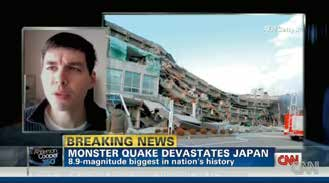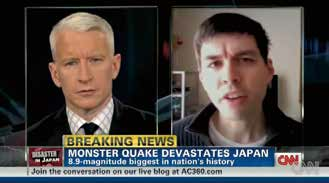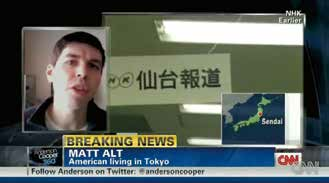Issue:



When an unsuspecting Tokyoite answered his phone on March 11, he stepped into the dazzling light of the 24/7 media machine.
● MATT ALT is in Tokyo ● “My sole qualifications were havin g endured a rough shake for approximately two minutes and the ability to speak English” ● “My sole qualifications
I am not a news correspondent. Yet there I was on March 11, 2011, describing the Tohoku earthquake on millions of American TV screens. I was among the very first on the ground in Japan to do so, just 45 minutes after the first tremors subsided. Already shocked by the earthquake and horrified by the first images of the tsunami slamming the Tohoku coastline, I remained utterly unaware of the media maelstrom I was about to be swept up in myself.
CNN was the first to call. At the time, my wife Hiroko served as the local editor for the Japanese-language edition of their now-defunct travel and lifestyle website. That she might get such a call at a moment of crisis had crossed our minds, though for a news media that “covers the world,” one would expect that we’d be farther down the go to list. Hiroko’s English is borderline native, but she is more comfortable behind a screen than on one. And so it was that I found the phone thrust at me, listening to her editor tell me I’d be getting a call from Atlanta soon.
Within minutes, I did. Almost instantly, call waiting rang. This one was from CNN New York. A heated discussion ensued between the two cities over who had “dibs” on me and my story. What the hell did I know? I toggled back and forth trying to make heads or tails out of the situation as the dueling producers grew more and more agitated. Eventually the matter was settled when one began a countdown and suddenly I found myself untethered, floating on live television with nothing but anchorwoman Rosemary Church’s questions to guide me.
She had to ask surprisingly few. The sole direction her producer had given me was to “just keep talking.” This I did, pacing the living room of our house. I’ve been told, by a variety of people, that I talk too much, and too loudly. Suddenly my twin Achilles’ heels were transformed into assets. Listening to the recording years later it’s on YouTube, of course even I am surprised by how I sound, as though another person took over for the duration.
There’s a unique cadence to television reports, a rhythm of stresses and pauses that seem designed to convey authority even when there is none. I found myself uncontrollably sliding into this linguistic lifejacket as I bobbed among the airwaves, following the directive to Keep Talking and praying my delivery didn’t sound like parody. I worried that I’d be asked some technical question about volcanology or regional demographics or some other field in which I had even less expertise. But for better or for worse the question was the simple news staple: how did it feel? I would answer that question over and over and over again, over the next 72 hours.
Anderson Cooper was worried about me
The phone began ringing the moment CNN hung up. It wouldn’t let up until the first overseas journalists landed in Japan several days later. I’m not sure how the producers got my number so quickly. But they were hungry for content and had found someone who could give it. My sole qualifications were having endured a rough shake for approximately two minutes and the ability to speak English.
My Twitter feed exploded. I went from a handful of followers to thousands in the blink of an eye. My Facebook and email inboxes flooded with friend requests and letters from well-wishers, old friends and old teachers from college and high school. Former neighbors phoned my parents after decades of having fallen out of touch. In the internet age it’s hip to run down “old-fashioned” media, but this response was a fascinating lesson in the incredible power and reach of mainstream television.
Interview requests continued to arrive via email and cell phone. I tried to respond to as many as I could. It would be easy to claim I did this for some higher purpose. The real reason was far simpler. It was cathartic. Talking kept me from thinking. Thinking about what was going on up north, about the overheating reactors, about how many people had died. How many of the victims had seen it coming? How many had just gotten home from the grocery store, as I had been when the quake hit Tokyo? How many still needed help when I was chatting away with news celebrities?
The next week was a blur of virtual “green rooms” and weehour Skype appearances. We took to unplugging the phone whenever we needed rest. An alphabet soup of media organizations deluged my inbox with Urgent Interview Requests for the internet, radio, and TV. CBC. NBC. CBS. Even the Oprah Winfrey Network. The absurdities piled up. One show subtitled me a “survivor.” Anderson Cooper asked, repeatedly, if I was “in a safe place” (I was in my living room). Once a nobody, suddenly I was going toe-to-toe with correspondents of major news organizations.
Things hit a personal low point about a week later. By this time, news of the reactor meltdowns completely dominated the coverage. Hiroko and I scrutinized the news for scraps of usable information while bookmarking websites and Twitter feeds of locals with Geiger counters. At times the radiation angle reached a hysterical pitch; you’d be forgiven for missing the fact that tens of thousands of people had been literally wiped off the face of the planet days earlier. The domestic sources were doing a decent job of covering things, or as decent a job as anyone could given the slim details Tepco and the government were doling out to the world, and if for whatever reason you didn’t trust them, a small army of foreign journalists had “parachuted” into Japan for their own countries’ piece of the action.
The end of the affair
I was asked by several foreign news organizations to go up north as a fixer. The work wasn’t unfamiliar to me; I’ve field produced segments for various organizations, albeit under less stressful conditions. But going closer than one needed to the steaming husk of Fukushima Daiichi seemed like utter folly, even before I discussed it with my wife, even before my parents phoned to politely request I stay put. Later I heard about someone who’d said “yes.” A major TV news organization had him set up a triage area in an emergency shelter. They weren’t triaging for injuries. They were triaging for people who were more likely to burst into tears on camera. It was about this time that I decided I’d had enough.
But for whatever reason lack of sleep? Inertia? Vanity? I allowed an MSNBC producer to coax me into appearing on Chris Matthew’s “Hardball.” It would require getting up at 5:30am for his live stateside broadcast. Hiroko and I were stretched thin, dealing with the aftershocks, the temporary food shortages, and now the threat of fallout from the reactors. One last time, I thought, and then I’m done. There are more important stories than some white guy who “suffered” two minutes of shaking. At 4:30, I began going down the final checklist with the producer. That’s when the direction came: “Just tell him what it was like when the tsunami hit Tokyo.”
I reminded her, not for the first time, that a tsunami had not hit Tokyo. It had hit many hundreds of kilometers north. A pregnant pause ensued. Presently I was told Chris’ current guest was running over and I wouldn’t be needed after all, so sorry to trouble you.
It’s a testament to the gutting of foreign news bureaus that someone like me even found a place in the media spotlight in the first place. But putting aside the lack of “boots on the ground,” the fact was nobody really knew what was going on at the time. The areas most affected by the disaster were all but cut off from the outside world, and the Fukushima reactors represented a classic “black box” situation in that nobody save for Tepco had any eyes and ears inside. (To a certain extent, not even they did.) Updates were sporadic, but the insatiable need to feed America’s 24/7 TV news cycle demanded daily, sometimes hourly scoops. A media baby crying for food, a change or simply attention.
This isn’t to say there wasn’t solid reporting going on during the crisis, though most of it was in print, and the majority of that by the rarest of beasts, the resident bilingual journalists. As a “civilian” stuck in the thick of it, the pieces that stung most were punditry crafted purely to stoke emotional responses at an already emotional time, while the best focused on attempting to convey facts, such as scientific or historical background, expanding on official releases, or the plight of those who had lost their homes or families. Often, chaotic situations unfold in dangerous locales of the sort only specialized correspondents are willing to go; a chaotic situation in a country as safe and easily accessible as Japan represented a Petri dish for the best and worst journalism had to offer.
In the end I was really only active for less than a week, filling the gap until the “name” journalists hit the ground themselves. As soon as the pros arrived, the requests dried up. I’ve never heard back from the army of producers and reporters who’d had me fill their Urgent Requests. I had no expectations or desire to turn a crisis into a career, but even I was a little shocked at how quickly and totally the spotlight shifted. It was an odd mix of relief tinged with withdrawal. The attention had been fleeting, but incredibly intense. For a brief moment I had reached millions more than I ever had with my own books, articles, translations, and television projects, a thrilling prospect for any content creator. That was the sense of loss. But of course, it wasn’t ever really about me. Thus the relief.
Today only a handful of YouTube videos remain as evidence of my little foray into the mass-media spotlight. Which is as it should be. Because in the end, none of the stress or sleepless nights I went through hold a candle to that of the people who lost family members and homes to the tsunami and nuclear disasters. Still, I’m honored to have had a tiny part in giving the world a window into a desperate situation in its earliest hours.
Matt Alt is a Tokyo-based writer and translator. He is the co-author of Yokai Attack! and other books on Japanese culture.

